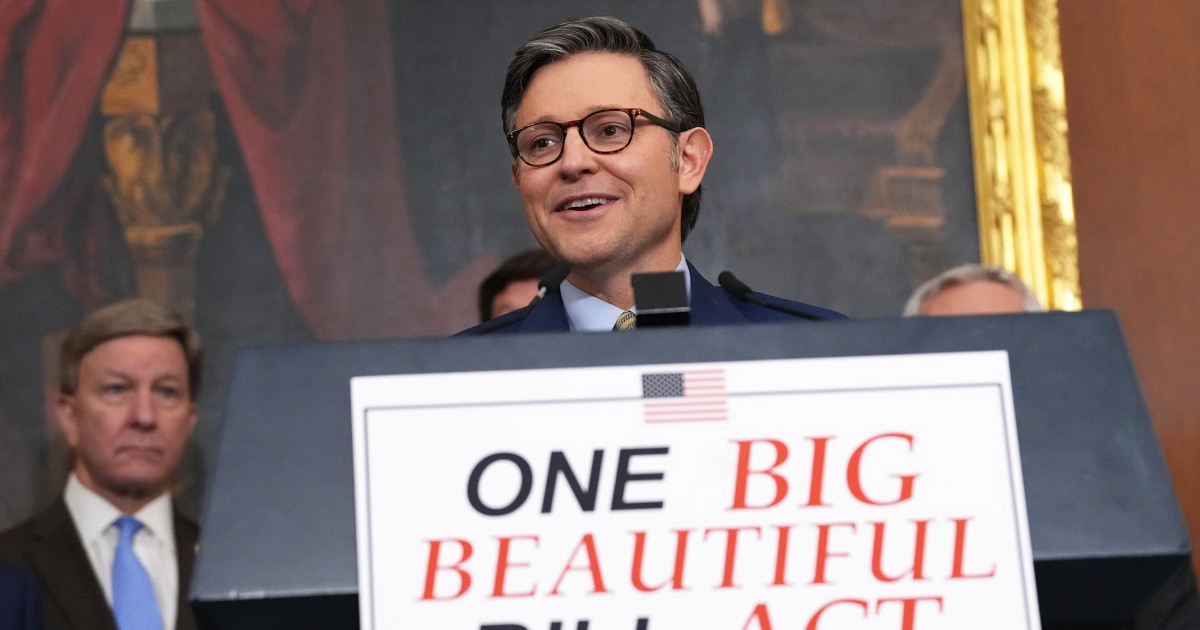There is a blatant contradiction between the effects of the owners of high observers and those in low -income families in a The sprawling legislative package Republicans in the House of Representatives Thursday passed.
The largest part of the financial benefits in the legislation – is called the “Law of the Grand Great Law” – You will flow to the richest Americans, with permission to tax cuts such as business owners and investors House owners in high -tax areasExperts said.
However, the low -time owners will be worse. This is greatly due to the Republicans partially met these tax cuts – estimated To cost about 4 trillion dollars or more – with Discounts To social safety network programs such as Medical aid and Complementary nutrition assistance programOr surprise, previously known as food stamps.
The tax and spending package is now heading to the Senate, where you may face more changes.
“It is strongly tilted towards the wealthy.”
Congress Budget Office, a non -party federal degree guard, Estimates 10 % income of families will decrease by 2 % in 2027 and 4 % in 2033 as a result of invoice changes.
On the contrary, those in the first ten places will get an increase in income from legislation: 4 % in 2027 and 2 % in 2033, found CBO.
Yale Budget Laboratory analysis I found a similar dynamic.
20 % of families – who achieve less than 14,000 dollars per year – will witness their annual income by about 800 dollars in 2027, on average, Yale’s capabilities.
It will witness the highest 20 % – those who earn more than $ 128,000 a year – grows at $ 9,700, on average, in 2027. The highest 1 % will get $ 63,000.
Yale and CBO analyzes do not explain at the last minute changes to the legislation of the House of Representatives, including the most striking work requirements for Medicaid.
“It is largely inclined towards the wealthy,” said Erney Tedishi, director of economics at Yale Laboratory for the Budget and former Economists in the White House of Economic House.
Legislation focuses Trembling nature Economists said the recent tariff policies in the Trump administration.
“If you merge [Trump administration’s] Tidishi said:
Most tax cuts in the bill go to the highest gain families
Experts said that there are several ways in which the draft law of the House of Representatives is deviated towards the richest Americans.
Among them are more valuable tax exemptions related to work revenues, government and local taxes and real estate tax, experts said.
Experts said that these tax exemptions are improperly flowing to the owners of the observers. For example, 80 % of its lower owners You will not see any benefit From the parliament proposal to raise the maximum salt to $ 40,000 from the current $ 10,000, according to the Tax Corporation.
The draft law also maintains a higher tax rate of 37 % lower, under the 2017 tax cuts and jobs law, which would end at the end of the year.
He has maintained a sound tax break that allows investors to protect capital gains from taxes by transferring money to “opportunities areas”.
Trump’s tax law was established for this tax exemption, with the aim of stimulating investment in low -income areas defined by state rulers. Taxers who hold “very focused” capitalist gains among the wealthy, According to To the tax policy center.
Finally, 60 % of the tax cuts on the bill will go to the highest 20 % of families and more than a third goes to those who get $ 460,000 or more, According to To the tax policy center.
The analysis said: “The difference between the income groups is remarkable.”
Why are many low -offs worse off?
However, more than 8 out of 10 families in general will get a tax reduction in 2026 if the bill is enacted, and the tax policy center is found.
Lower bullets are committed by rulings, including a standard standard and temporary reinforcement Child tax creditAnd tax tariffs are linked income The interest of the car loan, for example, said experts.
However, some of these benefits may not be valuable as it seems at first glance. For example, nearly a third of the distinguished workers do not pay federal income tax, Tedshi said. He said he would not benefit from the proposed tax secretions on the tips – that he is an organizer as a tax opponent, who does not benefit families without tax responsibility.
Meanwhile, low -income families, which depend more on federal safety network programs, will witness discounts on medicaid and Snap, the benefits associated with student loans and reasonable prices.
The draft law of home, for example, will impose work requirements for the beneficiaries of Medicaid and Snap. The total federal spending on these programs will decrease by about 700 billion dollars and 267 billion dollars, respectively, until 2034, according to the analysis of the Congress budget office.
However, “If you have a low income and do not get pre -supported, medicaid or ACA, you will be better off,” Smetters said.
Some observers will pay more taxes
In some sense, it may not be surprising that most tax advantages accumulate on the wealthy.
Smetters said that the United States has one of the most progressive tax systems in the developed world.
He said that the top 10 % of families pay about 70 % of all federal taxes. Such families will get about 65 % of the total value of the legislation, according to Penn Wharton analysis Publishing Monday.
A sub -group of observers – 17 % of the highest 1 % of families, who earn at least $ 1.1 million a year – will pay more tax, according to the tax policy center.
“This is partly due to the borders of some fireworks to deduct their local and local taxes completely on all discounts for the higher living families,” wrote Huard Galikman, his first colleague at the Tax Policy Center.


